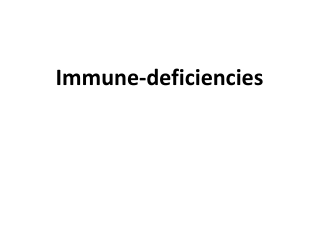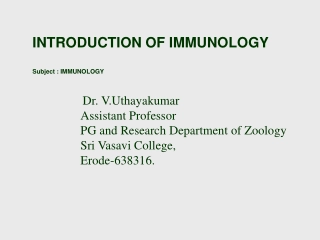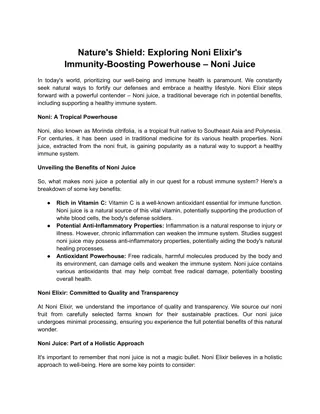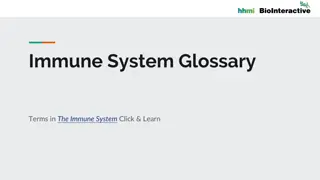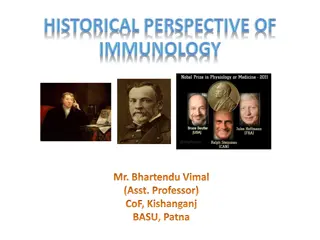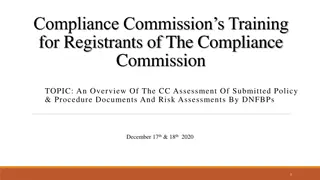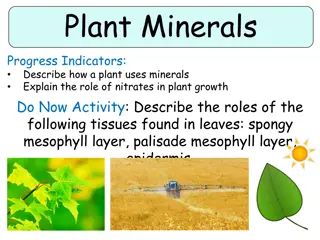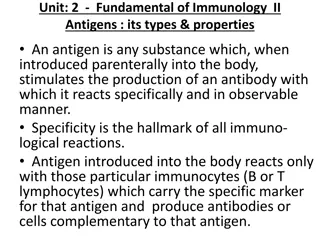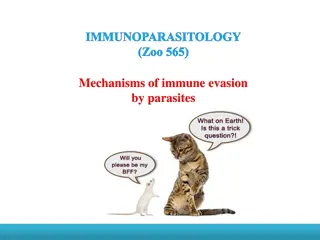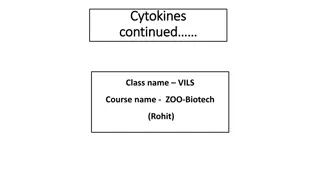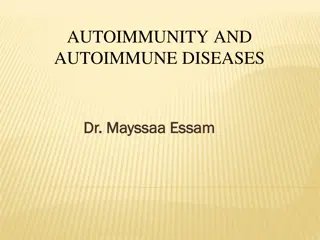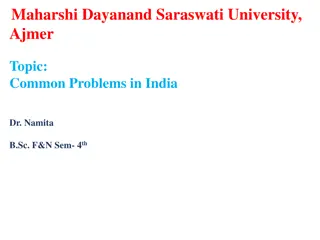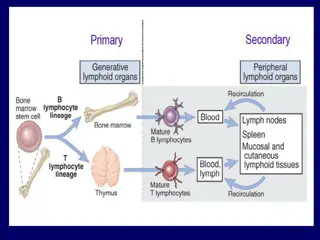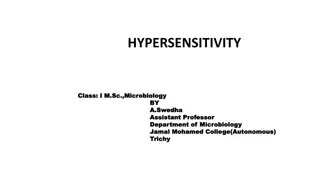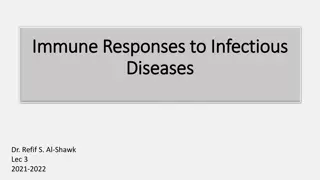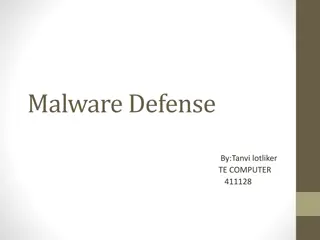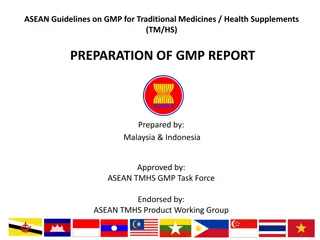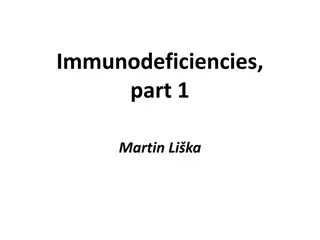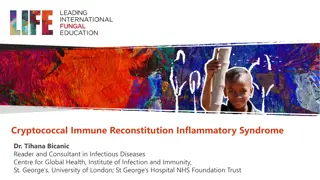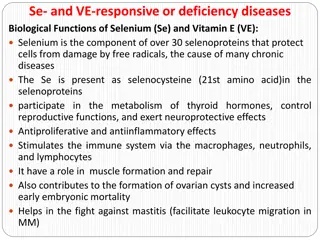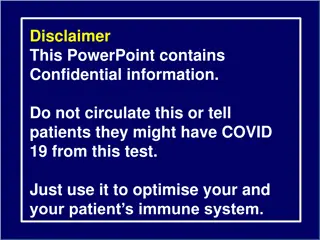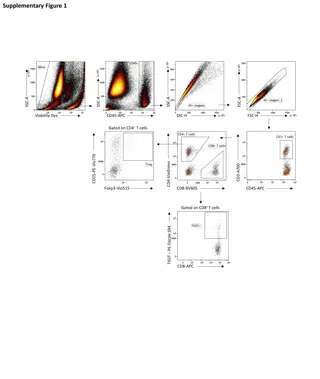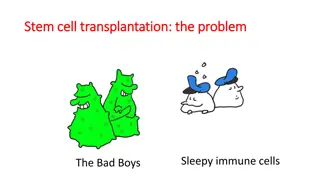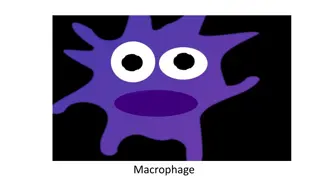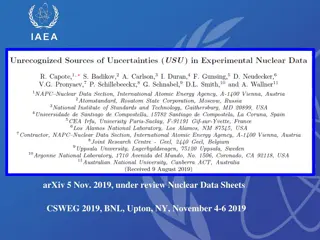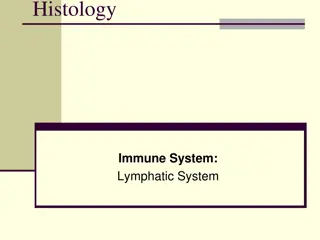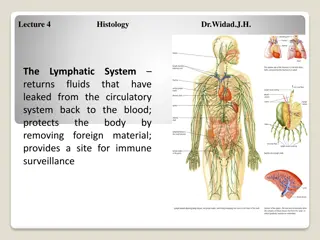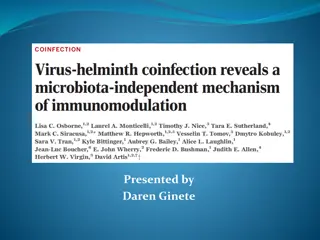Immune-deficiencies
Immune deficiencies can be classified into primary hereditary disorders based on clinical presentations, including cell-mediated, antibody-mediated, non-specific, and complement activation deficiencies. Major clinical manifestations of immune disorders range from B-cell deficiencies to phagocytic ce
2 views • 46 slides
INTRODUCTION OF IMMUNOLOGY
Explore the fundamentals of immunology with insights into immunogens, antigens, epitopes, and haptens. Uncover how these key components play vital roles in shaping immune responses and learn about paratopes, the basis of immunogenicity, and the key events that determine foreignness in the immune sys
0 views • 15 slides
BENEFICIAL OWNERSHIP TRANSPARENCY
South Africa's CIPC is addressing deficiencies in beneficial ownership transparency, as highlighted in the October 2021 Mutual Evaluation Report. The country faces increased monitoring due to being placed on the FATF Grey List. CIPC is mandated to establish a Beneficial Ownership Register to ensure
0 views • 16 slides
Understanding Immune Thrombocytopenia (ITP) and Its Impact
Immune Thrombocytopenia (ITP) is a rare autoimmune disease where the immune system wrongly attacks platelets, leading to low platelet count. It can affect individuals of all ages, with symptoms appearing post-virus, vaccination, or certain medications. ITP can result in fatigue, bruising, and bleedi
3 views • 30 slides
Nature's Shield_ Exploring Noni Elixir's Immunity-Boosting Powerhouse – Noni Juice
In today's world, prioritizing our well-being and immune health is paramount. We constantly seek natural ways to fortify our defenses and embrace a healthy lifestyle. Noni Elixir steps forward with a powerful contender \u2013 Noni juice, a traditional beverage rich in potential benefits, including s
0 views • 2 slides
Comprehensive Guide to Immune System Glossary Terms
Dive into the world of immune system glossary terms with definitions and visual aids. Explore key concepts such as immune cell activation, adaptive immune response, antibodies, antigens, and more. Understand the complex processes within the immune system through informative images and concise explan
1 views • 70 slides
Understanding the Immune System: Organs, Functions, and Importance
The immune system acts as a defense mechanism against pathogens and infections, comprising various organs, such as the bone marrow, thymus, spleen, white blood cells, antibodies, complement system, and the lymphatic system. It works to recognize and destroy harmful microbes, maintaining the body's h
1 views • 23 slides
Overview of Immunology: From Historical Perspectives to Modern Techniques
Immunology is the study of the immune system, its functions, and responses to various stimuli. The field traces back to ancient times, with historical figures like Thucydides and Edward Jenner contributing to its development. From innate immunity to adaptive responses, the immune system plays a cruc
0 views • 29 slides
Common Deficiencies in AML/CFT Policy & Procedures Documents
Update AML/CFT policy documents to align with current legislation, include policy statements on combating financial crimes, ensure staff awareness and compliance, conduct regular risk assessments, and obtain senior management approval for high-risk clients. Address deficiencies in suspicious transac
0 views • 10 slides
Plant Minerals and Farming Methods
Learn about how plants use minerals for growth, the role of nitrates, different leaf tissues, mineral deficiencies, and farming methods to ensure crop yield. Discover how plants obtain minerals from the soil, symptoms of mineral deficiencies, and the importance of fertilizers in farming. Explore dif
0 views • 13 slides
Understanding Antigens and Immunogens: Types and Properties
Antigens are substances that stimulate the production of antibodies in the body, exhibiting specificity in immune reactions. They interact with immune response products like antibodies, BCRs, and TCRs. Immunogens induce detectable immune responses, leading to antibody production or T cell activation
1 views • 30 slides
Mechanisms of Immune Evasion by Parasites in Immunoparasitology
Understanding how parasites evade the immune system of their hosts is crucial in the field of immunoparasitology. Parasites have developed various strategies such as anatomical seclusion, antigenic variation, and intracellular living to avoid host immune responses. Examples include Plasmodium within
0 views • 26 slides
Understanding the Significance of Cytokines in Immune Response
Cytokines play a crucial role in immune response activation and regulation. They are secreted by various cell types like lymphocytes, monocytes, and macrophages, exerting diverse biological functions, including immune system development, inflammatory response induction, and hematopoiesis regulation.
2 views • 12 slides
Understanding Autoimmunity and Autoimmune Disorders
Autoimmunity refers to the immune system's failure to recognize its own cells, leading to attacks on self-tissues. Autoimmune disorders encompass over 80 chronic illnesses where the immune system mistakenly targets organs. These disorders are poorly understood and recognized, impacting various organ
1 views • 20 slides
Nutritional Challenges in India: A Comprehensive Overview
India faces various nutritional problems, including protein-energy malnutrition, vitamin deficiencies, and macronutrient issues. The population struggles with common ailments like anemia, heart diseases, and obesity due to micronutrient deficiencies. Understanding and addressing these challenges are
0 views • 17 slides
Immune Response Regulation and Autoimmunity Overview
The immune system maintains a balance through tolerance mechanisms to prevent autoimmunity. Central and peripheral tolerance play crucial roles in immune unresponsiveness to self-antigens. Failure in immune regulation can lead to autoimmune diseases like diabetes and lupus. Vaccination, discovered b
0 views • 18 slides
Understanding Hypersensitivity Reactions in Immunology
Hypersensitivity in immunology refers to an altered immune response against antigens, leading to hyperreactivity and immunopathology. This article delves into the different categories of adaptive hypersensitivities, focusing on Immediate (Type I), Antibody-Mediated Cytotoxic (Type II), and Immune Co
0 views • 6 slides
Immune Responses to Parasitic Infections and Evasive Strategies by Protozoan and Helminth Parasites
Parasitic infections pose complex challenges to the immune system due to the diverse nature of parasites, including protozoans and helminths. Protozoan parasites move between arthropod vectors and mammalian hosts, requiring both humoral and cell-mediated immune responses. Meanwhile, helminths, as mu
0 views • 15 slides
Effective Antivirus Approaches and Malware Defense Strategies
Antivirus approaches play a crucial role in combating malware threats. Prevention is key, followed by detection, identification, and removal of viruses. Generic Decryption technology aids in detecting complex polymorphic viruses without causing any harm to the computer. CPU emulator, virus signature
1 views • 22 slides
Understanding White Blood Cells and the Immune System
Explore the intricate details of white blood cells (WBCs), their types, functions, formation, and crucial role in defending the body against infections. Delve into the immune system, comprising barriers, cells, tissues, and organs that combat invaders, with a focus on innate and adaptive immunity. L
0 views • 65 slides
Understanding Anti-Inflammatory Foods and Immune Function
Our health is closely linked to the gut microbiome, with fiber playing a key role in feeding beneficial gut bacteria. Incorporating anti-inflammatory polyphenols from plant-based sources like fruits, vegetables, and herbs can promote a healthier gut. Additionally, fermented foods act as natural prob
1 views • 8 slides
Understanding Food Nutrition and Health Essentials
This content provides valuable information on nutrients, their functions in the body, food sources, and the effects of deficiencies. It covers macronutrients like fat, protein, and carbohydrates, as well as micronutrients such as minerals and vitamins. Explore the importance of nutrients like Vitami
0 views • 26 slides
Understanding the Importance of the Immune System for Homeostasis
Explore the intricate workings of the immune system, from its component parts and defense mechanisms to the significance of homeostasis maintenance. Discover how non-specific and specific immune responses, phagocytosis, neutrophils, natural killer cells, and interferons play vital roles in protectin
0 views • 32 slides
ASEAN Guidelines on GMP for Traditional Medicines - Preparation of GMP Report
The ASEAN Guidelines on GMP for Traditional Medicines provide detailed instructions on preparing GMP reports, including post-inspection activities, deficiency classification, examples of deficiencies, and inspection report format. Deficiencies are categorized as Critical, Major, or Minor, with speci
0 views • 20 slides
Understanding Immunodeficiencies: Classification, Frequency, and Types
Basic immunological terms explain the functions of the immune system, including defense against infection, homeostasis, and immunological surveillance. Immunodeficiencies are disorders of the immune system that impair its ability to carry out these functions. They can be classified into humoral, cel
0 views • 39 slides
Understanding Cryptococcal Immune Reconstitution Inflammatory Syndrome
Cryptococcal Immune Reconstitution Inflammatory Syndrome (C-IRIS) is a condition where rapid reversal of immunodeficiency triggers exaggerated inflammatory reactions in response to Cryptococcus antigens. It can manifest as either Unmasking IRIS or Paradoxical IRIS, with common CNS presentations incl
0 views • 10 slides
Understanding the Roles of Selenium (Se) and Vitamin E (VE) in Health
Selenium and Vitamin E play crucial roles in protecting cells, promoting immune function, and maintaining reproductive health. Selenium is a key component of selenoproteins, while Vitamin E acts as an antioxidant. Together, they help combat oxidative damage, support thyroid function, and enhance cel
0 views • 11 slides
Insights into Micronutrient Deficiencies in Geriatrics: B12, Zinc, Selenium, Vitamin D, Iron, and Pharmaceutical Interventions
This presentation by Kate Walker, MD, RDN, LDN, CSG, provides detailed information on high-risk micronutrient deficiencies in older adults, focusing on B12, Vitamin D, and Zinc. It covers the identification of deficiencies, signs, symptoms, and updated recommendations for supplementation. Discussion
0 views • 45 slides
Common Deficiencies in Investment Adviser Examinations
Understanding common deficiencies in investment adviser examinations conducted by the Maryland Division of Securities is crucial for compliance. Issues such as delivery requirements, custody, advisory fees, and financial books and records are highlighted with recommendations for improvement. Strengt
0 views • 20 slides
Understanding Immunotoxicity in Fish: An Alternative Model for Toxicological Studies
The study explores the immunotoxic effects of industrial effluents on fin fish, highlighting xenobiotics' impact on the immune system. It discusses the sensitivity of the immune system to environmental toxins and the elicitation of immune reactions by various substances. The importance of fish as a
0 views • 25 slides
Optimizing Immune System Through Holistic Approach
This PowerPoint presentation contains confidential information on optimizing the immune system to enhance overall health. It outlines a holistic approach involving neurological organization, meridian testing, and spectroscopic emission to support well-being. The content emphasizes the importance of
0 views • 27 slides
Immune Cell Analysis Supplementary Figures
This collection of supplementary figures provides detailed flow cytometry data on immune cell populations, including CD4+ T cells, CD8+ T cells, tumor-associated macrophages, and more. The figures also include information on immune checkpoint molecules like PD-L1 and TIGIT. Each figure presents spec
0 views • 4 slides
Delegated Powers to Amend Retained EU Law by Alison Pickup
The UK's decision to leave the EU was driven by a desire for sovereignty and control of its laws. The Great Repeal Bill aimed to smoothly transition EU laws into domestic legislation while providing the government with powers to address deficiencies in retained EU law post-Brexit. The bill includes
0 views • 14 slides
Understanding Stem Cell Transplantation: Removing Sleepy Immune Cells and Fighting "The Bad Boys
Stem cell transplantation involves addressing the issue of immune cells failing to recognize and eliminate tumor cells, known as "The Bad Boys." By removing the dormant immune cells and replacing them with new ones from a compatible donor, the therapy aims to empower the immune system to target and
0 views • 8 slides
Journey of Immune Cells in the Body
Explore the different stages of the immune response, starting with macrophages in the innate immune system that act fast without memory. Follow the path to the spleen and lymph nodes where T cells, already educated at birth to recognize specific antigens, await. Witness the intricate dance of the im
0 views • 18 slides
Deficiencies in Nuclear Data Evaluations and Uncertainty Assessment
In this document, Roberto Capote from IAEA discusses deficiencies in neutron data evaluations and statistical models for uncertainty assessment. The content covers topics such as USU definition, identification of outliers, and what is not considered USU. Various neutron data standards and evaluation
0 views • 14 slides
Nutrient Deficiencies in Obese Children and Adolescents
Obesity in children and adolescents can lead to multiple nutrient deficiencies, creating a double burden on their health. The diagnosis involves understanding local nutritional issues, clinical assessments, dietary recalls, and biological evaluations. Common deficiencies include vitamins A, D, E, fo
0 views • 6 slides
Understanding the Lymphatic System and Immune Response
The lymphatic system, a vital component of the immune system, consists of lymphocytes, plasma cells, and other cells within a framework of reticular cells and fibers. It includes lymphoid organs like the bone marrow, thymus, lymph nodes, and spleen. Diffuse lymphatic tissue and lymphatic nodules are
0 views • 20 slides
Overview of the Lymphatic System and Immune Response
The lymphatic system plays a crucial role in returning leaked fluids back to the blood, protecting the body from foreign materials, and supporting immune surveillance. It consists of lymphoid cells such as T and B lymphocytes, macrophages, dendritic cells, and reticular cells that work together to d
0 views • 31 slides
Understanding Helminths and Immunomodulation: A Comprehensive Study
Helminths, parasitic organisms affecting a large part of the global population, can modify the immune response through immunomodulation. This research delves into the interaction between helminths, microbiome, and immune response, exploring the effects on macrophages, alternative activation, and the
0 views • 28 slides
